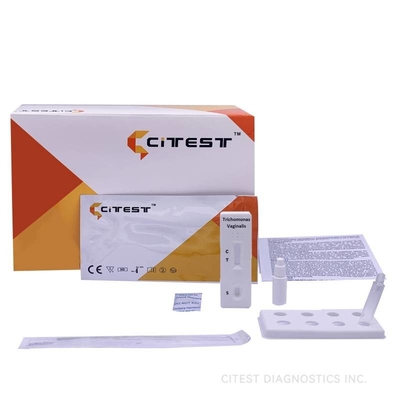

Trichomonas Vaginalis Rapid Test Cassette with Vaginal Swab and CE Certificate
| Product features | Parameters |
| Principle | Chromatographic Immunoassay |
| Format | Cassette |
| Specimen | Vaginal Swab |
| Certificate | CE |
| Reading Time | 15 minutes |
| Pack | 10 T |
| Storage Temperature | 2-30°C |
| Shelf Life | 2 Years |
| Sensitivity | 90.00% |
| Specificity | 96.30% |
| Accuracy | 95.00% |
Application:
The Trichomonas Vaginalis Rapid Test Cassette (Vaginal Swab) is a rapid chromatographic immunoassay for the qualitative detection of Trichomonas Vaginalis antigen from vaginal swabs. This test is intended to be used as an aid in the diagnosis of Trichomonas infection.
Description:
Trichomonas Vaginalis is an anaerobic, flagellated protozoan parasite and the causative agent of trichomoniasis. It is the most common pathogenic protozoan infection of humans in industrialized countries.Infection rates between men and women are similar with women being symptomatic, while infections in men are usually asymptomatic.
Transmission usually occurs via direct, skin-to-skin contact with an infected individual, most often through vaginal intercourse. The WHO has estimated that 160 million cases of infection are acquired annually worldwide. The estimates for North America alone are between 5 and 8 million new infections each year, with an estimated rate of asymptomatic cases as high as 50%. Usually treatment consists of metronidazole and tinidazole.
How to use?
Allow the test, specimen swab, buffer and/or controls to reach room temperature (15-30°C) prior to testing.
1. Place a clean extraction tube in the designated area of the workstation. Add 10 drops of extraction buffer (approx. 560μl) into the extraction tube.
2. Put the specimen swab into the extraction tube, vigorously mix the solution by rotating the swab forcefully against the side of the tube for least 10 times (while submerged). Best results are obtained when the specimen is vigorously mixed in the solution.
3. Allow the swab to soak in the reaction buffer for 1 minute prior to the next step. Squeeze out as much liquid as possible from the swab by pinching the slide of the flexible extraction tube as the swab is removed. At least 1/2 of the reaction buffer solution must remain in the tube for adequate capillary migration to occur.
4. Discard the swab in a suitable bio-hazardous waste container, then fit on the extraction tube tip onto the extraction tube.
5. Remove the test cassette from its sealed pouch, and place it on a clean and level surface. To obtain a best result, the assay should be performed within one hour.
6. Add 3 drops of extracted sample (approx. 100μl) from the extraction tube to the specimen well(S) on the test cassette. Please note avoid trapping air bubbles in the specimen well(S) and do not drop any solution in observation window.
7. Wait for the colored line(s) to appear. The result should be read at 15 minutes, do not interpret the results after 20 minutes.
![]()
INTERPRETATION OF RESULTS
(Please refer to the illustration above)
POSITIVE: * Two colored lines appear. One colored line should be in the control line region (C) and another colored line should be in the test line region (T). A positive result indicates that Trichomonas Vaginalis antigen was detected in the specimen.
*NOTE: The intensity of the color in the test line region (T) will vary depending on the concentration of Trichomonas Vaginalis antigen present in the specimen. Therefore, any shade of color in the test line region (T) should be considered positive.
NEGATIVE: One colored line appears in the control line region (C). No line appears in the test line region (T). A negative result indicates that Trichomonas Vaginalis antigen is not present in the specimen, or is present below the detectable level the test.
INVALID: Control line fails to appear. Insufficient specimen volume or incorrect procedural techniques are the most likely reasons for control line failure. Review the procedure and repeat the test with a new test. If the problem persists, discontinue using the test kit immediately and contact your local distributor.
Order Information
| Cat. No. | Product Description | Specimen | Format | Kit Size | Cut-Off | Status |
| ITV-502 | Trichomonas Vaginalis Rapid Test Cassette | Vaginal Swab | Cassette | 10 T | See Insert | CE |